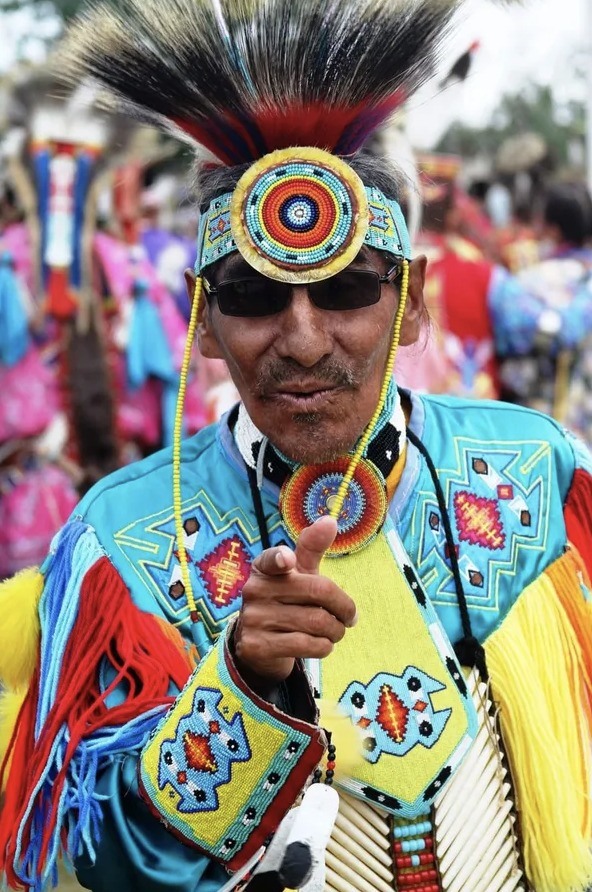Famous Blackfeet grass dancer dies at 62
NORA MABIE
Great Falls Tribune

Joe Sam Scabby Robe, legendary grass dancer and world traveler, died of throat cancer on June 22 at 62 years old. Courtesy Of Joseph Andre “Anjo” Scabby Robe
Joe Sam Scabby Robe, legendary grass dancer, dies at 62.
When Joe Sam Scabby Robe was inducted into the Montana Indian Athletic Hall of Fame in 2018 as a grass dancer, he was battling throat cancer and wasn’t doing well.
No one expected him to dance, but Scabby Robe came to the event donned in full regalia.
“When I saw he was in his regalia, I just thought, ‘Oh s***, watch out,'” Don Wetzel Sr., founder of the hall of fame, recalled. “He got out there, and he didn’t skip a beat. He was the same then as he was 40 years ago when I first saw him dance. It blew people away.”
Scabby Robe, champion grass dancer who traveled the world for powwow events – and made friends everywhere he went – died of throat cancer on June 22. He was 62 years old.
Scabby Robe, who is Blackfeet, was born on June 7, 1959 to parents Audrey Marie Whitegrass and Joe Scabby Robe.
Wetzel coached Scabby Robe on the Browning High School Boy’s cross country team, and Scabby Robe served as Wetzel’s manager for the school’s basketball team from 1972 to 1980. Wetzel remembers Scabby Robe coming to every practice and game, sometimes getting so passionate he would earn technical fouls from the bench.
“He sat right next to me on the bench for eight years as we won state titles,” Wetzel said. “We just connected. I think it was a spiritual thing. It was almost like we were brothers.”
“I don’t know how else to say it, but when Joe Sam passed, I lost a part of myself. I loved him, and I wish others could’ve learned more from him.”Don Wetzel Sr.
As the team saw success on and off the court, Wetzel said he envisioned his players and Scabby Robe becoming Blackfeet leaders.
“Those boys were tough. They would’ve been outstanding tribal councilmen, elders and storytellers,” Wetzel said. “When you win, your attendance goes up, your GPA goes up. It’s a huge deal, and we had that. That’s why I say those boys should’ve been leaders.”
But Wetzel said too many of those players have died young, from alcohol, illness or car accidents.
“Joe Sam would’ve been an excellent cultural leader. But he and too many others have passed. We’re losing our spirit. I learned the way from my elders, so now some kids are going to miss out on that,” he said. “I don’t know how else to say it, but when Joe Sam passed, I lost a part of myself. I loved him, and I wish others could’ve learned more from him.”
***
‘The man of 1,000 moves’: Scabby Robe was a champion dancer.
While he also performed fancy dance and chicken dance, Scabby Robe was famous as a grass dancer, a fast-paced style of Native American powwow dancing that includes sweeping motions, mimicking swaying grass.
Scabby Robe traveled the powwow circuit every summer, sometimes hitchhiking across the country to get to the next event.
Sometimes called “the man of 1,000 moves” or “the legend,” Scabby Robe was a champion dancer, often taking first place in the powwows he attended. As his fame grew, he performed in countries around the world, including Russia, Poland, Denmark, Japan, Taiwan and the Netherlands. He was the first dancer to be inducted into the Montana Indian Athletic Hall of Fame.

“He was the greatest dancer I’ve ever known,” said John Ground III, Scabby Robe’s relative and travel partner. “His style was hard to duplicate. His movements were choreographed from head to toe. He was fast, then slow. It was really unique.”
Rainbow Azure, Scabby Robe’s dance partner, said when Scabby Robe danced, “it was like he was telling a story.”
“His style was so smooth, like he was dancing on water. He was very balanced. He would go low and then high, he would go left then right,” Azure said. “Everywhere he went, he brought that energy – that dance, it’s medicine.”
If Scabby Robe couldn’t find a vehicle to get to a powwow, he would ask Frank Thomas, a close friend, to take him to the events. Thomas said the two traveled the country’s powwow circuit for years.
“He’d call me and say, ‘Hey brother, let’s go here. There’s a powwow there,'” Thomas recalled. “He loved it so much. It was his life.”
But Thomas said Scabby Robe didn’t dance for recognition or awards, rather he danced for his people.
“One time at Fort Belknap, someone shook my hand and thanked me for bringing Joe Sam. She asked if Joe Sam could dance at her mom’s 90th birthday, and Joe Sam said yes. He went out to Fort Belknap and danced for her birthday, and she was so excited. He was really humble and would do stuff like that all the time,” Thomas said. “His dancing would make people feel good about themselves.”
As his cancer worsened, Scabby Robe didn’t stop dancing. His son, Joseph Andre “Anjo” Scabby Robe, said when his father was honored at a Bozeman powwow in 2017, he had a tracheotomy placed in his neck to help him breathe.
“He danced at that powwow,” Anjo recalled. “Even with that (tracheotomy). No one expected him to dance but when he did, everyone got up to dance with him. It was amazing. He was just the greatest at dancing grass.”
Scabby Robe is survived by four siblings, Lucky Whitegrass, Marcia Sue Kicking Woman, Wanda Scabby Robe and Kenny Scabby Robe; six children, Joseph Andre Scabby Robe, Sammy Joe Leona Scabby Robe, Julie Anne Scabby Robe LittleChief, Mike Scabby Robe, Dave Scabby Robe and Haven Scabby Robe; and six grandchildren, Ashley EagleSpeaker, Taelyn Scabby Robe, Andre Scabby Robe, Koda Rain Scabby Robe, Chevyo Scabby Robe and Dillon Scabby Robe.







